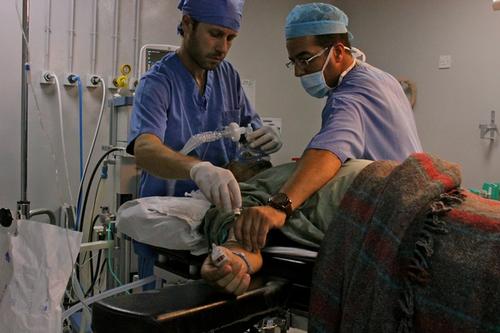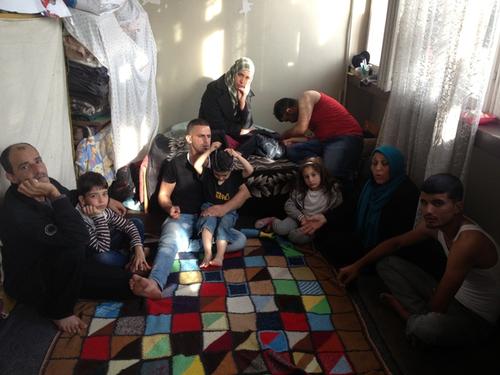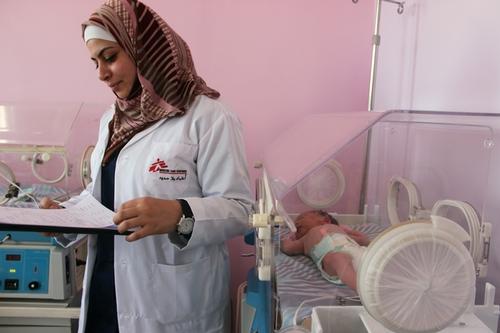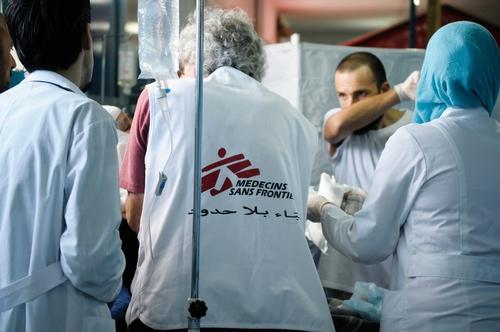Emergency surgical programme in Al Ramtha Hospital in Jordan treats hundreds of war wounded patients from Syria
War wounded
Ramtha town in northern Jordan borders Dara’ Governorate in southern Syria, which sees some of the heaviest fighting in the conflict. The majority of war wounded arriving in Jordan go to the Ramtha Hospital, a Ministry of Health structure, less than five kilometres from the nearest border.
MSF’s Emergency Surgical Programme inside the Ramtha Government Hospital has two operating theatres and recovery rooms, and two wards – with a total of 33 beds. Since opening in September 2013, MSF has conducted 309 life-saving surgeries on over 140 patients, including people needing multiple amputations and with severe abdominal, chest and orthopaedic injuries. We offer physical therapy and mental health services and general inpatient care. So far a total of 221 mental health consultations have been carried out.
“I was going to get something from the car, I heard the sound of shelling and bombing, then I said to myself I have to get inside. Before I managed, the area was bombed. I couldn’t breathe for almost a minute, and then I started screaming and calling my dad. He carried me to the field hospital. I don’t remember anything after that. I was in so much pain, I was hitting my face from the pain."
- MSF patient Qusay, a 12 year-old boy from Dara, Syria, who lost both his legs
“I have four daughters and two sons. It was almost 5 pm. We wanted to sit in front of the house with some friends, and then to go to pray in the mosque. After 5 minutes a nearby location was bombed by rockets. We heard people screaming and crying so we went to provide some first aid, and while we were there we were hit by another rocket. I woke up and found myself in Jordan. I didn’t know what happened after the attack. My left leg was amputated. My hands and my right leg are fractured. I thought I was dead. I didn’t imagine I would be still alive now. I don’t know even who brought me here. All my family still live in Syria, I don’t know what happened to them. I didn’t even manage to call them. My family thought I was dead."
- A 41 year-old male from Dara’ governorate, Syria
A project for victims of war
Most patients are first seen by one of 14 field hospitals in Dara’ governorate, operating in a war zone, and short on many essential supplies. Patients usually come to MSF through a network of Syrian doctors based in Ramtha providing logistical support to get patients into Jordan, and in direct contact with the field hospitals.
“This is a project for victims of war, specifically war wounded who cross the borders from Syria into Jordan," said Ramtha Medical Team Leader, Dr. Amber Alyan. “Patients cross the borders after being wounded as a result of the war, they go through a sort of triage at the border where it is determined if they can cross into Jordan. MSF receives around 80% of the cases coming into Ramtha from the border. When we started this project, we expected that patients would need one to two surgeries initially. But, as we are treating such severe cases many patients are needing 4-5 surgeries.”
Rehabilitation needs
Long term needs for patients often include rehabilitation such as prosthetics (artificial limbs) and physiotherapy. MSF is referring patients with such needs to Handicap International. Many patients also have long term mental health needs, some of which are being met by other NGOs in Jordan.
War wounded patients admitted to Al Ramtha Government Hospital are not registered as refugees in Jordan. Once discharged from the hospital, some return to Syria if they don’t require further medical follow up. Others seek refuge at one of the refugee camps in Jordan, namely Al Za’atri in Mafraq. Or, if they are sponsored by a Jordanian family they are permitted to reside in a host community.






